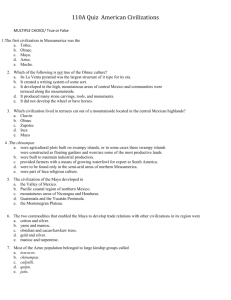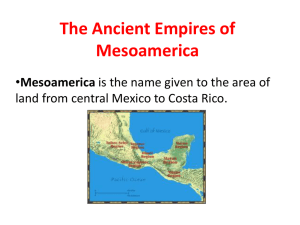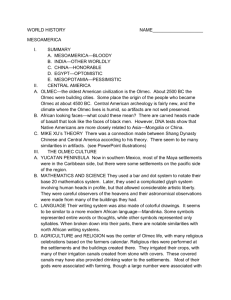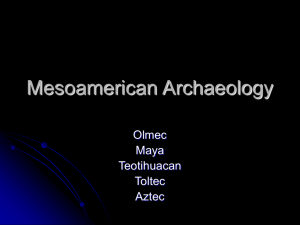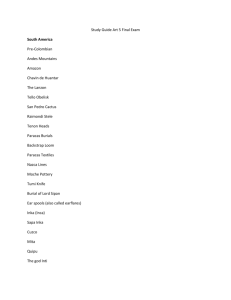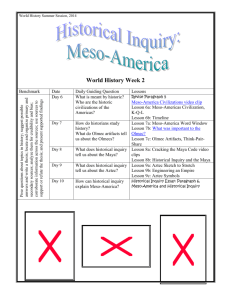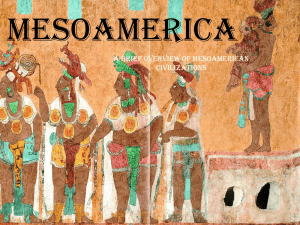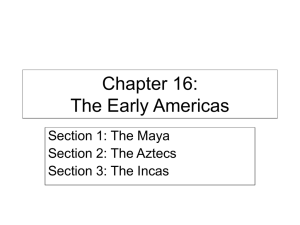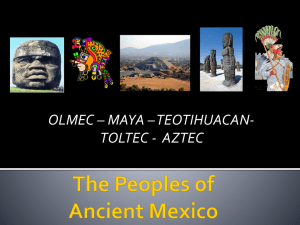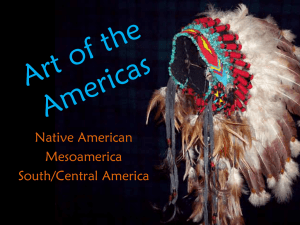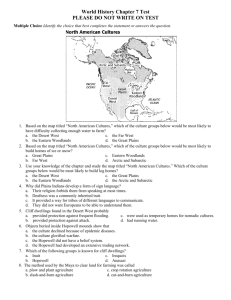Ancient Mesoamerica
advertisement
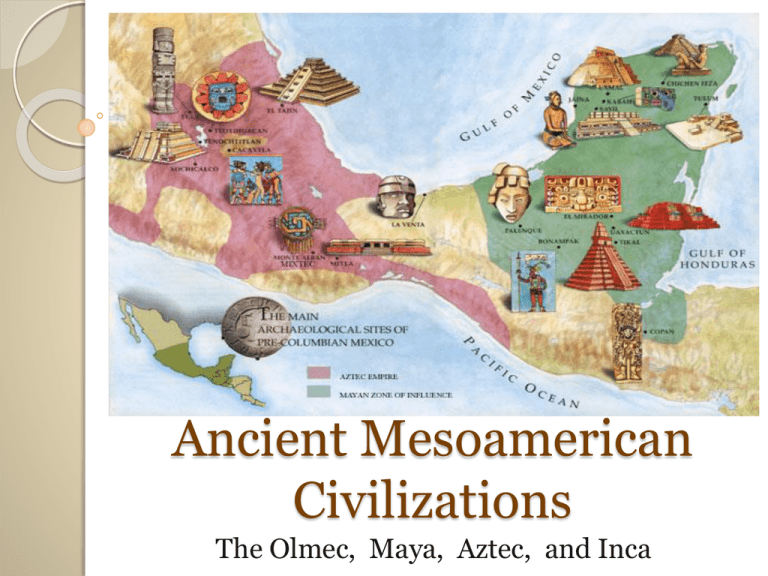
Ancient Mesoamerican Civilizations The Olmec, Maya, Aztec, and Inca Cornell Notes Red = Left Black = Right Blue = DO NOT WRITE Mesoamerica What does it mean? Where is it located? Mesoamerica is the region that is now Mexico and Central America. In pre-Columbian times, it was the most densely populated region of the Americas. Meso = middle America = North and South America At the Height of Power Timeline Olmec Maya Aztec Inca • 1200 B.C. – 600 A.D. • First known civilization to form in Latin America. • 250 A.D. – 900 A.D. • Developed in what is now called the Yucatan Peninsula. • 1200 A.D. – 1521 A.D. • Built their capital on what is now Mexico City. • 1438 A.D. – 1533 A.D. • Developed in the Andes Mountains in what is now Peru. Olmec Where did they live? The Olmec lived along the Gulf Coast of modern-day Mexico in tropical rain forests and lowlands from around 1200 BCE to 400 BCE. Who did they influence? Both the Maya and the Aztecs were influenced by the Olmec civilization, the earliest known civilization in Mesoamerica. Who was in charge? Sculptures and temples indicate that kings or priests led the Olmec society. ◦ This focus on religious leadership influenced later civilizations in the region. What did the religious centers look like? At former religious centers characterized by pyramidshaped temples, giant stone heads weighing 10 tons stood up to 11 feet tall. Olmec Contributions The Olmec also developed a form of writing, as well as a calendar. What allowed the Olmec to spread their culture? Through their trade networks, the Olmec were able to spread many characteristics of their culture, religion, architecture, and social structure spread north to the Valley of Mexico and around Central America. Olmec Cultural Hearth The beginning of a cultural traits The Olmec are considered a cultural hearth by historians. The Olmec are known for HUGE stone sculptures of heads. Around 600 B.C. the Olmec began to abandon their cities for unknown reasons. Maya Where are they The Maya lived in modern-day southern Mexico and Central America. located? including the areas that are today Belize, El Salvador, Guatemala, and Honduras. They were an agriculture-based society. They grow corn, beans, and squash, and practice many of the same crafts, such as weaving and pottery. Their central location made it very easy for the Maya to trade and interact with other cultures from North and South America. How did they trade? The Maya built a large and complex system of roads to stay connected with other cities and peoples. What is left behind? Mayan ruins include huge ziggurat and observatories used by astronomers. What do they grow? How did their location help them? 1. Created a 365 day calendar by watching the stars. 2. The Maya used math and were the first people to use the zero. 3. Developed glyph writing using symbols that stood for words. Mayan Contributions The Maya Rubber… What!!! Another unusual Mayan crop was rubber. The Maya cut slits in the bark of the rubber tree and collected its sap. They used the dried sap to make water-resistant shoes and clothing. Rubber was also used to make balls. The Maya played games in enclosed, I-shaped courts with the rubber balls. These ball games took on a ritual significance and were an important part of Mayan culture. Mayan Ball Game The court was approximately 25 feet wide, by 75 feet long. The ball was six inches in diameter and made out of rubber and weighed about eight pounds! This made the game very difficult to play and could cause severe injury. In contrast, a modern football is filled with air and weighs less than one pound. The game was a combination of basketball, volley ball, and soccer. Two teams of two to eleven players would play the game. They would try and get a rubber ball through a small hoop that was about twenty-seven feet off of the ground. The players would have to keep the ball in motion using parts of their bodies like hips, thighs and forearms, but the use of hands and feet was not allowed. The ball was very hard to get through the hoop. Because of this, when a player successfully got the ball through a hoop, the spectators would have to give him their jewelry. The court was shaped like an upper case I and many believe it to be the first team sport. Explore the Mayan Ball Game The Aztecs Where did they live? Where was the Capital? Aztec people settled in the Valley of Mexico and what is now Mexico City. the capital city of Tenochtitlan ◦ approximately 30 million living in the entire empire. Toltec Empire The Aztecs were fierce warriors who used military power to build a huge empire. Collecting taxes from the people they conquered was how the Aztec became so wealthy. What was another name for the Aztec people? What were the Aztecs known for? How did they become rich? Aztec Religion Priests were highly respected. Most important God to the Aztecs was the Sun God. To please their gods, Aztecs offered human sacrifices for their Gods Contributions of the Aztec Doctors learned to set bones and dentists learned to treat cavities. Engineers created bridges to connect the island capital together. Developed an accurate calendar Established schools Aztec Capital At the height of Aztec civilization there were over 300,000 people living in the capital city of Tenochtitlan and approximately 30 million living in the entire empire. The Inca Where did they live? Who was in charge? What was farming like? What did they grow? How did the Inca move? The Incas developed in the Andes Mountains in what is now Peru. The Incas were ruled by an emperor who had absolute power. To farm the steep land: ◦ ◦ they cut terraces into the mountainside built aqueducts to irrigate crops. The Inca grew mostly corn and potatoes. The Inca built 14,000 miles of roads: ◦ On which runners carried messages to far cities and the capital of Cuzco. ◦ Many of theses roads are still used today. Farming in the Andes Incan Roads Contributions of the Inca To keep records the Inca used quipus which are knotted cords used as counting tools.
